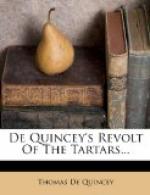By the Will
of God,
Here, upon the Brink of these Deserts,
Which from this point begin and stretch
away,
Pathless, treeless, waterless,
For thousands of miles, and along the margins of
many mighty Nations, 5
Rested from their labors and from great
afflictions
Under the shadow of the Chinese
Wall,
And by the favor of KIEN LONG, God’s
Lieutenant upon Earth,
The ancient Children of the Wilderness—the
Torgote Tartars— 10
Flying before the wrath of the Grecian
Czar,
Wandering Sheep who had strayed away from the
Celestial Empire
in the year 1616,
But are now mercifully gathered again, after
infinite sorrow,
Into the fold of their forgiving Shepherd.
15
Hallowed be the spot
and
Hallowed be the day—September
8, 1771!
Amen.
FOOTNOTES:
[5] Singular it is, and not generally known, that Grecian women accompanied the anabasis of the younger Cyrus and the subsequent retreat of the Ten Thousand. Xenophon affirms that there were “many” women in the Greek army—[Greek: pollai esan etairai en to strateumati]; and in a late stage of that trying expedition it is evident that women were amongst the survivors.
[6] “Trashed.” This is an expressive word used by Beaumont and Fletcher in their “Bonduca,” etc., to describe the case of a person retarded or embarrassed in flight, or in pursuit, by some encumbrance, whether thing or person, too valuable to be left behind.
[7] There was another ouloss equally strong with that of Feka-Zechorr, viz. that of Erketunn under the government of Assarcho and Machi, whom some obligations of treaty or other hidden motives drew into the general conspiracy of revolt. But fortunately the two chieftains found means to assure the Governor of Astrachan, on the first outbreak of the insurrection, that their real wishes were for maintaining the old connection with Russia. The Cossacks, therefore, to whom the pursuit was intrusted, had instructions to act cautiously and according to circumstances on coming up with them. The result was, through the prudent management of Assarcho, that the clan, without compromising their pride or independence, made such moderate submissions as satisfied the Cossacks; and eventually both chiefs and people received from the Czarina the rewards and honors of exemplary fidelity.
[8] All the circumstances are learned from a long state paper on the subject of this Kalmuck migration drawn up in the Chinese language by the Emperor himself. Parts of this paper have been translated by the Jesuit missionaries. The Emperor states the whole motives of his conduct and the chief incidents at great length.
[9] Camels “indorsed” “and elephants indorsed with towers.”—MILTON in Paradise Regained.




